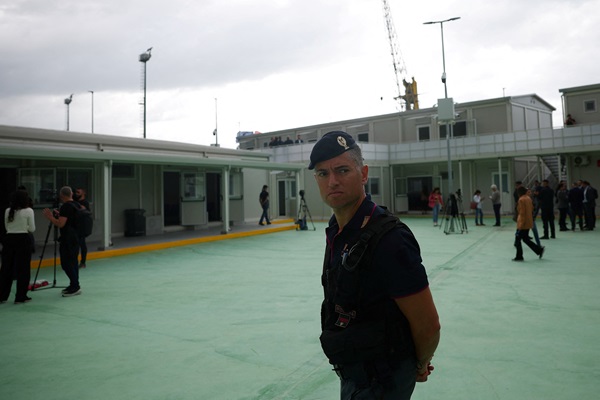 An Italian police officer stands inside the reception camp at the port where Italy will process illegal migrants, in Shengjin, Albania, on 11 October 2024.;
Credit: REUTERS/Florion Goga
An Italian police officer stands inside the reception camp at the port where Italy will process illegal migrants, in Shengjin, Albania, on 11 October 2024.;
Credit: REUTERS/Florion Goga
SHENGJIN, Albania (Reuters) - Two reception centres built in Albania to take in migrants arriving in Italy opened their doors on Friday 11 October 2024, an Italian official said, part of a deal between the two countries aimed at curbing irregular migration into the European Union.
The deal is the first example of a non-EU country accepting migrants on behalf of an EU nation and has drawn the interest of other Western nations seeking to discourage the growing numbers of migrants arriving from Africa, the Middle East and beyond.
"As of today the two centres are operational and ready to welcome the first ones," said an Italian official who spoke on condition of anonymity in the port town of Shengjin, a port on Albania's Adriatic coast where one of the facilities is located.
The 2023 deal with Albania stipulates that irregular migrants arriving in Italy will be taken by boat to Shengjin, where they will be identified and their applications for asylum processed. They will then be driven a short distance inland to the small town of Gjader, where they will be accommodated.
Around 500 Italian personnel including prison guards, police, soldiers and Carabinieri will be based in both camps.
"Everything you see here is under Italian jurisdiction. Practically as you are in Italy," an official told Reuters in the Gjader centre, which currently can host about 400 people.
Once completed, in a few weeks' time, the Gjader centre will have capacity for 3,000 people. It will be staffed by Albanians, with the exception of the security guards, who will be Italians.
The centre consists of two sections - one for migrants waiting for their asylum requests to be processed, and one for migrants awaiting deportation following rejections of their asylum requests.
Under the deal, Albania, one of Europe's poorest countries and a candidate for EU membership, cannot host more than 3,000 migrants in total at any one time.








